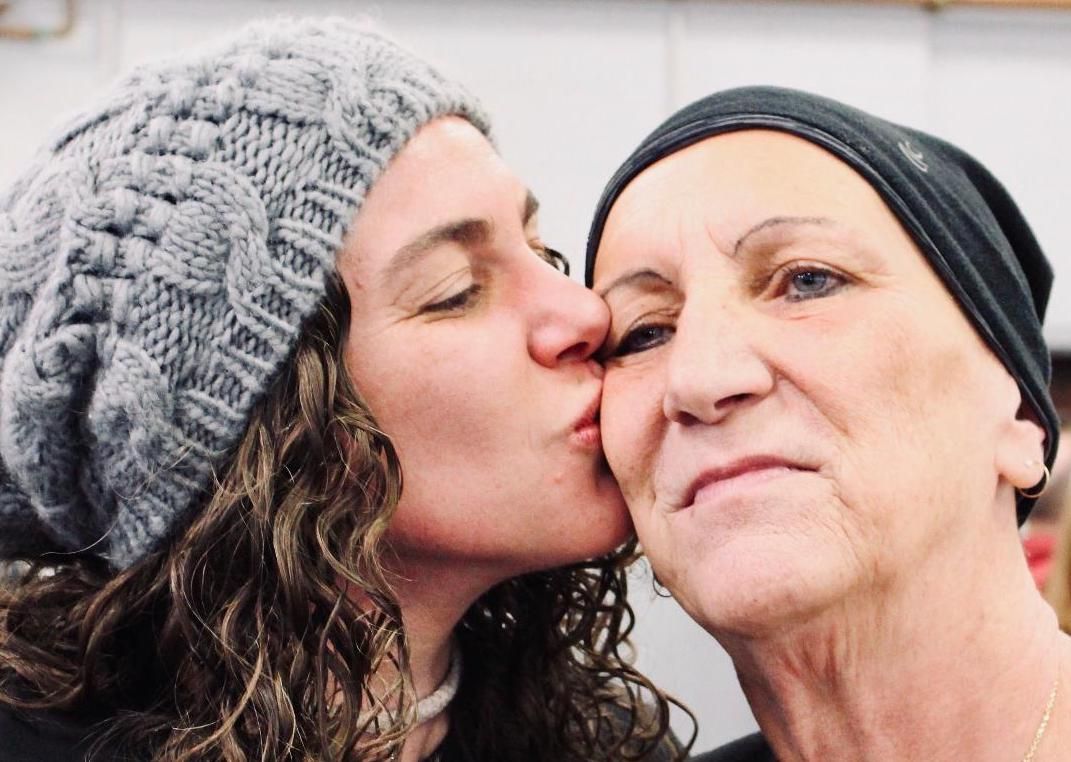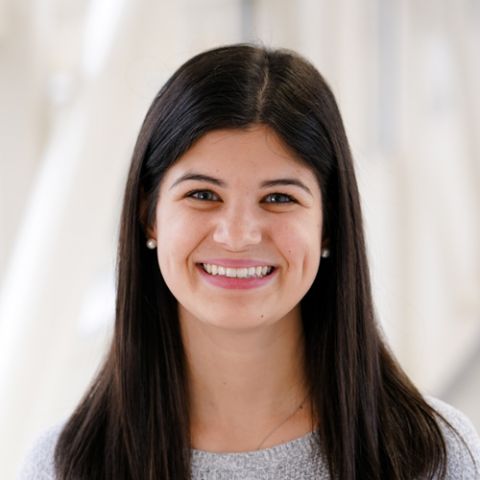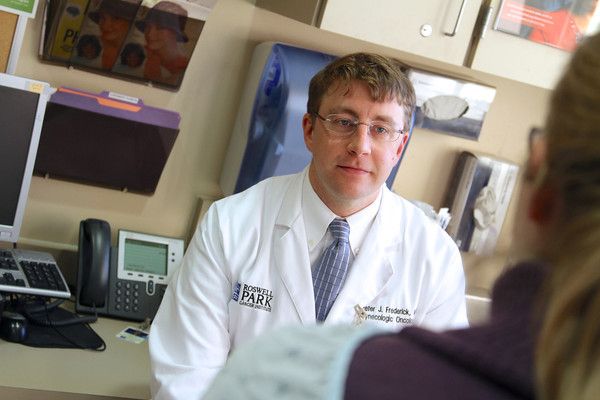Angela Eschrich, 64, and her daughter, Ashley, 36, have a lot in common. They both have boundless energy, stunning blue eyes, incredible courage and optimism, and — unbeknownst to them until two years ago — a BRCA2 gene mutation that greatly increases their risk of getting cancer, including ovarian cancer and breast cancer.
That risk became reality for Angela in early 2019 when she was diagnosed with Stage 4 ovarian cancer. Now Angela and her daughter are working with doctors and genetic counselors in Roswell Park’s High-Risk Ovarian Cancer Clinic to prevent the same thing from happening to Ashley.
As with many cases of ovarian cancer, Angela’s diagnosis came as a shock. “After having a hysterectomy in 1995 due to several large uterine fibroids, I was told by two different gynecologists that my ovaries were no longer functioning and I would never have a problem with them,” Angela recalls.
“So you can imagine how surprised I was when, in 2018 — after visits to the chiropractor and massage therapist did nothing to ease a persistent backache — my GP told me he felt something abnormal near my appendix. When he suggested I get it checked out by a gynecologic oncologist, three different friends recommended Dr. Peter Frederick, MD, FACOG, because they knew he was kind and incredibly skilled. Then, as an additional perk, we learned that Dr. Frederick sees patients once a month at Roswell Park’s Care Network practice in Jamestown, which is closer to our home in Pennsylvania.”
Within days of meeting of Dr. Frederick, Angela learned that the cancer had spread to her spleen and some lymph nodes. A plan was quickly set in motion: Angela would have four doses of chemotherapy, and then, if the tumors had shrunk enough, she would have surgery to remove her ovaries.
Genetic Testing Reveals Clues to Cancer Risk
Dr. Frederick recommended that Angela undergo genetic testing, per National Comprehensive Cancer Network (NCCN) guidelines for most ovarian cancer patients. “Although most cancers are a sporadic occurrence, approximately 20-25% of ovarian cancers are related to an inherited gene mutation,” says Dr. Frederick.
Because Angela tested positive for the BRCA2 mutation, it was recommended that Ashley — Angela’s only child — undergo genetic testing, too.
Angela and Ashley had a simple blood draw, as well as a review of family history and a genetic counseling session with Roswell Park’s Katherine Latina, MS, CGC.
“My heart sank,” Angela says of the moment she learned that her daughter also tested positive for the BRCA2 mutation. “I felt responsible for passing that gene to her.”
But with characteristic optimism and courage, Ashley framed it this way: “I looked at this as a blessing in disguise. Yes, the news was scary, but knowing that we have this genetic mutation means that, with the help of Roswell Park, there are measures we can take so that both of us have a much better chance of surviving what is too often a fatal disease.”
Angela concurs. “I survived a serious stroke and brain bleed six years ago, and I came back strong from it. Surviving this is just another thing I need to do in life. Ashley means everything to me, and I am not going to leave her!”
Making a Plan Forward
Together, Angela and Ashley worked with Dr. Frederick, Latina, and breast surgical oncologist Jessica Young, MD, Director of the Breast Cancer Risk Assessment and Prevention Program at Roswell Park, to come up with plan. “My team and I help families identify and manage the breast cancer risk associated with high-risk breast and ovarian cancer gene mutations, such as BRCA1 and 2, through observation, surveillance and consultation,” says Dr. Young.
Both Angela and Ashley have blood tests regularly to monitor their levels of CA-125, a protein that is associated with ovarian cancer. Every six months they have mammograms or MRIs to screen for breast cancer tumors. Ashley also undergoes regular ultrasounds to determine the absence or presence of any ovarian cancer tumors.
Ashley will continue to be monitored by Drs. Young and Frederick. She will undergo double mastectomy at some point, and, unless other complications arise, she will have her ovaries and fallopian tubes removed by the time she turns 40. “My Roswell Park team discussed possible fertility-sparing measures with me, such as harvesting my eggs or leaving my ovaries intact, but I chose not to. Even though I don’t have any kids of my own, I am a teacher, with more than 400 kids a year to love and guide, and I am content with that,” she says.
Treating Angela’s Ovarian Cancer
Meanwhile, after four sessions of chemotherapy infusions in 2019, Angela’s tumors were significantly reduced, and Dr. Frederick performed surgery to remove her ovaries, omentum and all evidence of any remaining tumors, a process called debulking. She then had another three sessions of chemotherapy, and is now taking Lynparza (olaparib), a maintenance therapy drug that inhibits the PARP proteins that help certain types of cancer cells proliferate. “I consider myself lucky, because this drug seems to be working very well at keeping my BRCA2 ovarian cancer in remission, with very few side effects,” she says. As proof that the treatment is working, Angela notes that when she was first diagnosed with ovarian cancer, her CA-125 level was 1189 U/mL and it is now only 10 U/mL.
Angela and Ashley have high praise for Katherine Latina and Drs. Frederick and Young, and the feeling is mutual. “The entire staff at the Jamestown clinic loves it when Ashley and Angela come in, because they obviously enjoy life, and even though they are going through serious cancer treatments, they have a lot of fun together, are appreciative of the care we provide, and always have a positive outlook,” says Dr. Frederick.
Are You At Risk?
Learn whether your family’s cancer history suggests that you should consider genetic screening. If you face higher-than-average risk due to a genetic mutation or other factors, Roswell Park’s High-Risk Breast Cancer Clinic and High-Risk Ovarian Cancer Clinic can help by providing a risk assessment, screening and a plan for treatment or monitoring.
Editor’s Note: Cancer patient outcomes and experiences may vary, even for those with the same type of cancer. An individual patient’s story should not be used as a prediction of how another patient will respond to treatment. Roswell Park is transparent about the survival rates of our patients as compared to national standards, and provides this information, when available, within the cancer type sections of this website.





